

Researching Careers: Career Research Checklist. Developing a Strategic Vision for Your Career Plan. Printer-Friendly Version by Randall S.
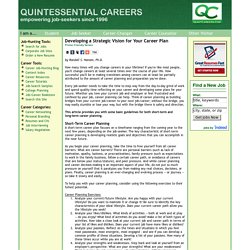
Hansen, Ph.D. How many times will you change careers in your lifetime? If you're like most people, you'll change careers at least several times over the course of your life. How successful you'll be in making transitions among careers can at least be partially attributed to the amount of career planning and preparation you've done. This article provides you with some basic guidelines for both short-term and long-term career planning. Short-Term Career Planning A short-term career plan focuses on a timeframe ranging from the coming year to the next few years, depending on the job-seeker.
Long-Term Career Planning Long-term career planning usually involves a planning window of five years or longer and involves a broader set of guidelines and preparation. Useful Tools/Resources for Career Planning Follow the links below to some extremely useful tools and resources to enhance your career planning experiences. Plotting the Story of Your Ideal Career. Printer-Friendly Version by Katharine Hansen, Ph.D.
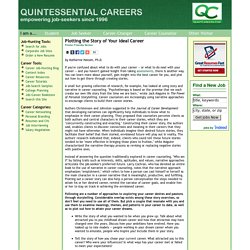
If you're confused about what to do with your career -- or what to do next with your career -- and you haven't gained insight from taking assessments, there is another way. You can learn more about yourself, gain insight into the best career for you, and plot out how to get there through creating stories. A small but growing collection of research, for example, has looked at using story and narrative in career counseling.
"Psychotherapy is based on the premise that we each create our own life story from the time we are born," wrote Jack Maguire in The Power of Personal Storytelling. Following are a number of approaches to exploring your career desires and passions through storytelling. Write the story of what you wanted to be when you grew up. 10 Tips for Successful Career Planning. Printer-Friendly Version by Randall S.
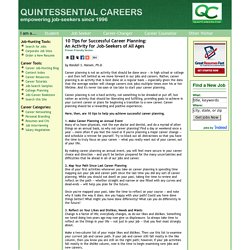
Hansen, Ph.D. Career planning is not an activity that should be done once -- in high school or college -- and then left behind as we move forward in our jobs and careers. Rather, career planning is an activity that is best done on a regular basis -- especially given the data that the average worker will change careers (not jobs) multiple times over his or her lifetime.
The Five-Step Plan for Creating Personal Mission Statements. Creating a Career Vision for Your Life. Printer-Friendly Version by Randall S.
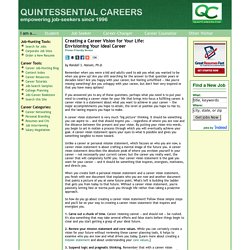
Hansen, Ph.D. Remember when you were a kid and adults used to ask you what you wanted to be when you grew up? Are you still searching for the answer to that question years or decades later? Goal-Setting: Developing a Vision & Goals for Your Career Plan. Developing a Career Vision Statement Having a clear vision of the end state we are trying to achieve before we take action to reach our goals is the key factor in accomplishing any goals that we set.
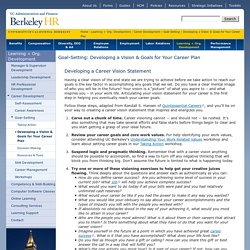
Do you have a clear mental image of who you will be in the future? Your vision is a “picture” of what you aspire to – and what inspires you – in your work life. Articulating your vision statement for your career is the first step in helping you eventually reach your career goals. Follow these steps, adapted from Randall S. Carve out a chunk of time. Setting Career Development Goals Goal-setting techniques are used by successful people in all fields. The following are some tips for setting effective goals: Express your goals positively, rather than framing them in terms of what you don't want. The Learning + Organizational Development (L+OD), in partnership with the Counseling and Psychological Services, offers a workshop that helps you take action in your career. Goal setting worksheet & other tips. Click on the concepts for more information. possibility a mindset of possibility allows you to get into creative visualization and clearly articulate your life without self-created limitation. a few things to consider when writing your vision and goals: let your past be in the past. we tend to look at the past in order to create our future, yet a goal set from the past will likely create more of what already exists, and inherently has limitations We tend to create our future based on what's happened in the past.
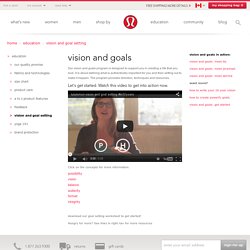
The 'story' that we bring with us comes with limitations so a goal set from the past will likely create more of what already exists. remove perceived constraints. what limitations do you create for yourself that don't actually exist? 'I don't have enough money'. Vision balance audacity is this goal easy to achieve? Format integrity.